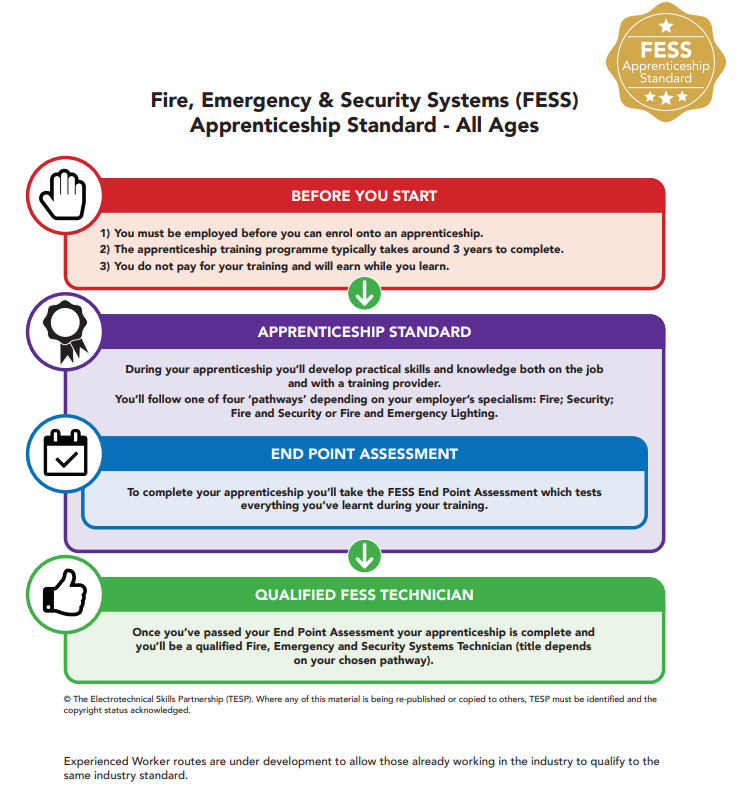The Fire, Emergency and Security, otherwise known as FESS, Apprenticeship Standard has been developed by the industry, for the industry. Pat Allen, chair of the FESS Employer Group, and National Electrotechnical Training (NET) explains more.
What is the FESS Apprenticeship Standard?
The Fire, Emergency and Security Systems (FESS) Technician Apprenticeship Standard was launched following a Government Review of all apprenticeships across England, which found many to be unfit for purpose and developed without employer needs in mind.
To address these findings, the core principle of the new FESS Apprenticeship Standard is that it is developed by employers, for employers. Companies such as Banham Security, Chubb, Secom, Amalgamated Ltd, Abel Alarm, Johnson Controls and Lindum Fire are part of the FESS Employer Group that are responsible for the ongoing management of the apprenticeship standard, to ensure it remains fit for purpose.
At government level, The Institute for Apprenticeships and Technical Education has designated the Employer Group as the ‘guardian’ of the apprenticeship standard and looks to the group to review the standard, make changes where necessary and ensure it reflects modern fire and security skills, technology and practices.
A Tailored Approach
Whilst many core skills and behaviours taught in the apprenticeship are generic across both fire and security – such as working safely, electrical and electronic principles, customer services, core system components and techniques – the benefit of the FESS Apprenticeship Standard is that candidates can enrol on specific ‘Pathways’. These cover fire, security, and a combination of both, to provide an even more tailored approach for installers and their employees.
 Rigorous Training and Assessment
Rigorous Training and Assessment
With the introduction of the Apprenticeship Standard came some new elements to make the training more robust. The first is a focus on Safe Isolation, which now should be essential, safety-critical working practice for all installers. Secondly, the introduction of a two-day End Point Assessment at the end of the training programme to test whether the apprenticeship has gained all the knowledge, practical skills and behaviours required.
The End Point Assessment
A core element of the apprenticeship process is a new concept to the fire and security industry: End Point Assessment (EPA). The EPA is a final, in-depth review of an apprentice’s skills and knowledge that they must complete before they can pass their apprenticeship.
What’s in the EPA assessment?
The EPA has been designed by the same Employer Group responsible for the Apprenticeship Standard, to ensure the apprentice is being assessed in line with the standard’s assessment plan, industry needs and current working practices.
It’s a comprehensive two-day assessment with practical skills tests in areas such as safe isolation, takeover of an existing installation, additions to existing systems and commissioning. Apprentices’ knowledge is tested on health and safety, electrical and electronic principles and a wide range of other areas and, importantly, a professional discussion is included to allow the apprentice to demonstrate they have effective behaviours that will build and retain trust with customers and colleagues. The three key areas include:
- Practical skills test
- Underpinning knowledge test
- Professional discussion
BPEC and Highfield are the End-point Assessment Organisations (EPAOs) responsible for the creation and delivery of the EPA via approved assessment centres that apprentices must attend to undertake the assessment.
Find out more about it in our guide to the End Point Assessment article, here: Your guide to the End Point Assessment in security and fire
Employer’s role in the End Point Assessment
If you employ apprentices, it’s in your best interest to make sure they’re as prepared as possible for the EPA, to help ensure they pass first time.
How can you do this? The ‘Readiness for Assessment Checklist’ from your chosen End-Point Assessment Organisation helps you to look at exactly as the name suggests: are they ready for the assessment?
The checklist presents each section of the assessment and what needs to be done, so you can look at how much knowledge and experience they have in each area.
It’s really important to review and complete the checklist as part of a three-way partnership between you, your apprentice and your training provider.
Your training provider should be asking you to sit down with them and your apprentice towards the end of their apprenticeship, to take an honest look at their current abilities and where the gaps are. If your apprentice can’t select at least ‘Adequate’ for every statement in the checklist, they’re unlikely to be ready for the assessment.
If there are areas where they’re not feeling confident, your training provider should produce an action plan to work on the items where they need more knowledge or practical experience.
Each party has to sign the checklist and submit it before the assessment can be booked. As an employer it’s vital that you do not sign the checklist until you’re confident they have the right level of skills and knowledge.

Graphic from The Electrotechnical Skills Partnership
The Future of FESS
This year work begins on the first review process, at which stage the Employer Group will consult with industry to look at what updates need to be implemented.
Watch this space for more news and updates as the Employer Group continues to promote the apprenticeship as the gold standard for the industry.
It is worth noting that there are different variations of Level 3 apprenticeships across England, Wales, Scotland and Northern Ireland. These are as follows:
- England: Fire, Emergency and Security Systems Apprenticeship level 3
- Scotland: Modern Apprenticeship in Electronic Security Systems level 3
- Northern Ireland: Electronic Fire and Security Apprenticeship level 3
- Wales: Fire, Emergency and Security Apprenticeship level 3
This article was first published in February 2020. It has since been updated to keep in line with changes to the FESS apprenticeship standard in fire and security.
Additional resources
- More information on the FESS Apprenticeship Standard
- Your guide to the End Point Assessment in security and fire
- Find a FESS Apprenticeship Training Provider
- Top 10 things employers should know about apprenticeships
- How Engineers of Tomorrow is tackling the skills gap
- The Electrotechnical Skills Partnership

 Rigorous Training and Assessment
Rigorous Training and Assessment 






[…] Certification Scheme (ECS) has issued a reminder that from 1 January 2021 the new requirements for Fire, Emergency and Security Systems (FESS) ECS occupations will become compulsory for all new (initial) card applications. All new applicants […]
[…] Find out more information on the Fire, Emergency and Security Systems Apprenticeship standard. […]
[…] READ: Everything you need to know about the FESS apprenticeship standard in fire and security […]
[…] ensure parity across the whole industry, it has been based on the same content as the FESS Apprenticeship, so both new entrants and existing workers are being assessed and accredited to the same […]
[…] The Fire, Emergency and Security Systems (FESS) Technician Apprenticeship Standard was launched following a Government Review of all apprenticeships across England, which found many to be unfit for purpose and developed without employer needs in mind. […]